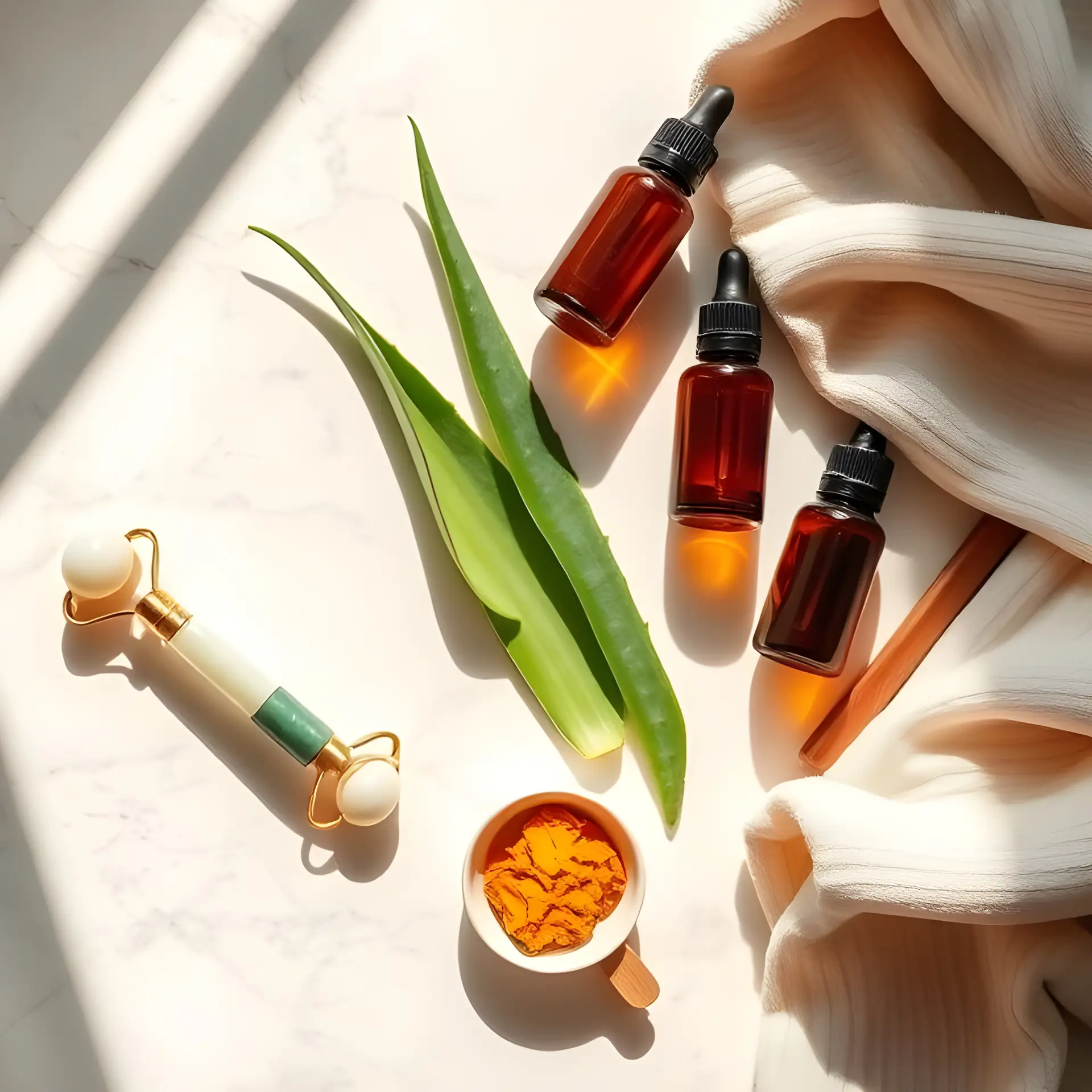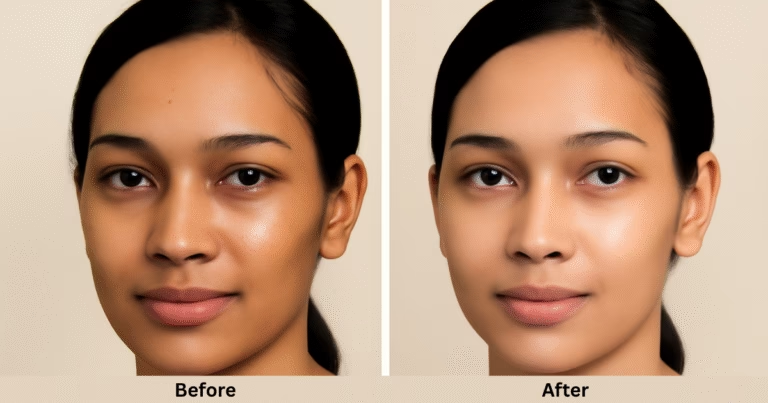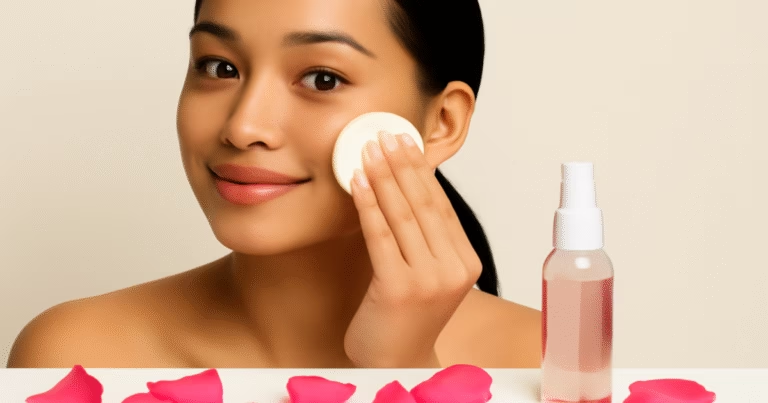Introduction: My Skin, My Story
Let me take you back a few years. My bathroom shelf was a mini-museum of skincare products—serums promising eternal youth, creams with names I couldn’t pronounce, and toners that smelled like a chemistry lab. Despite the hefty price tags and glossy advertisements, my skin was in rebellion: breakouts, dryness, and constant discomfort.
One day, after yet another allergic reaction, I decided to simplify. I turned to natural skincare—not because it was trendy, but because I was desperate for relief. And guess what? My skin sighed in relief.
Table of Contents
Key Takeaways: Embracing Natural Skincare
- Gentle on Sensitive Skin: Natural ingredients like aloe vera and chamomile soothe rather than irritate.
- Free from Harsh Chemicals: Avoids synthetic additives like formaldehyde-releasing preservatives, which have been linked to health concerns .
- Rich in Nutrients: Packed with vitamins, antioxidants, and essential fatty acids that nourish the skin.
- Eco-Friendly: Biodegradable and sustainably sourced, reducing environmental impact.
- Holistic Approach: Aligns with Ayurvedic principles, promoting overall well-being.
Understanding Natural Skincare
What Does “Natural” Really Mean?
The term natural skincare often brings to mind images of lush gardens and pure ingredients. But it’s essential to understand that “natural” isn’t a regulated term in the beauty industry. This means products labeled as natural can still contain synthetic components. Therefore, reading ingredient lists and understanding what you’re applying to your skin is crucial.
Natural vs. Chemical Skincare
| Aspect | Natural Skincare | Chemical Skincare |
|---|---|---|
| Ingredients | Derived from plants and minerals | Synthesized in labs |
| Skin Compatibility | Generally gentle and nourishing | Can be effective but may cause irritation |
| Environmental Impact | Often eco-friendly and biodegradable | May involve pollutants and non-renewable resources |
| Cost | Can be more expensive due to sourcing | Often more affordable due to mass production |
The Benefits of Natural Skincare
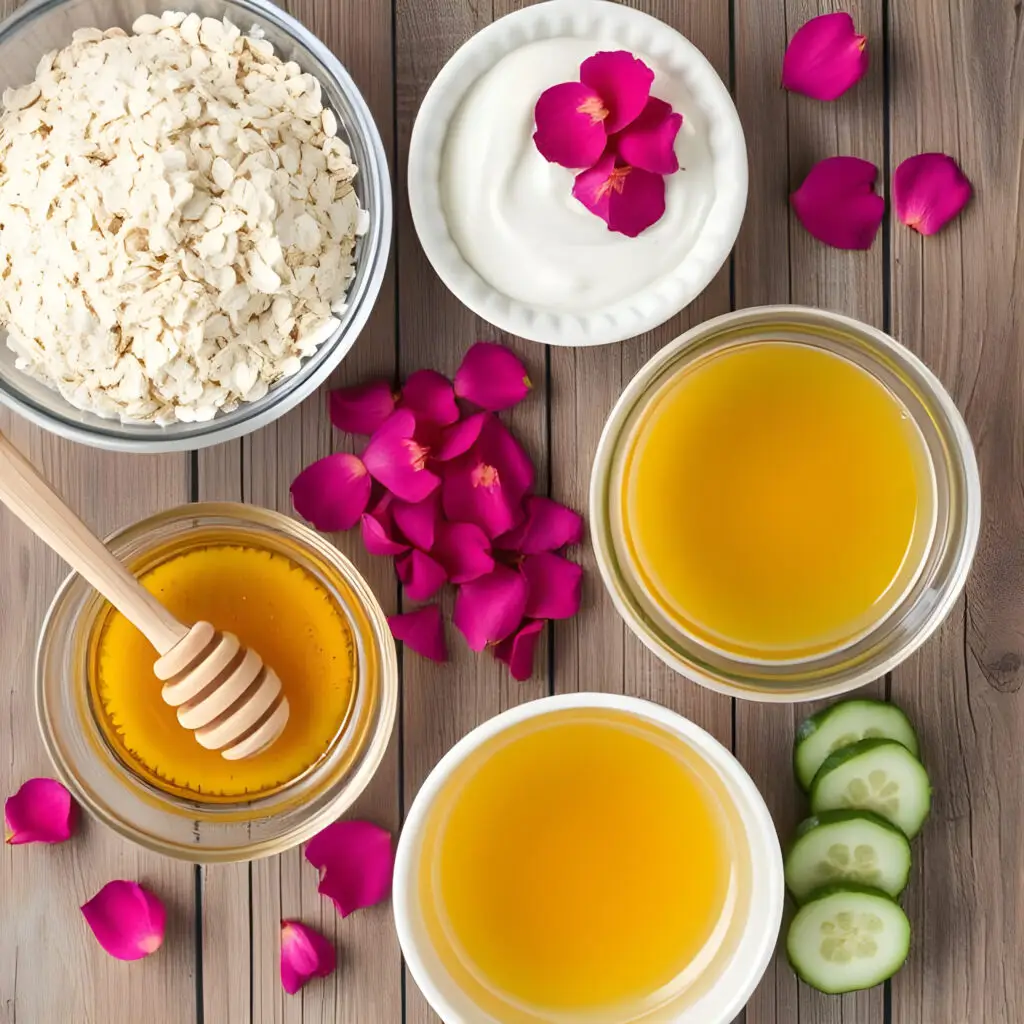
Nourishment from Nature
Natural skincare products are rich in antioxidants, vitamins, and essential oils that provide deep nourishment. For instance, carrot seed oil is known for its anti-aging properties and ability to protect the skin from UV damage.
Reduced Risk of Irritation
Many synthetic skincare products contain parabens, phthalates, and sulfates, which can cause skin irritation or allergic reactions. Natural products, especially those free from artificial fragrances and dyes, are less likely to cause such issues.
Environmental Responsibility
Choosing natural skincare also means making an eco-conscious decision. Many natural products use sustainable packaging and biodegradable ingredients, reducing your carbon footprint.
Ayurvedic Insights into Skincare
Ayurveda, the ancient Indian system of medicine, emphasizes balance and holistic well-being. In Ayurvedic skincare:
- Dosha-Specific Care: Skincare routines are tailored to one’s dosha (body constitution)—Vata, Pitta, or Kapha.
- Herbal Ingredients: Use of herbs like neem for its antibacterial properties, turmeric for anti-inflammation, and sandalwood for cooling effects.
- Natural Oils: Application of oils like coconut, almond, and castor to nourish and balance the skin.
Incorporating Ayurvedic principles can lead to a more personalized and effective skincare regimen.
Practical Tips for Transitioning to Natural Skincare
- Start Slow: Introduce one natural product at a time to monitor how your skin reacts.
- Read Labels: Look for certifications like USDA Organic or Ecocert to ensure product authenticity.
- DIY Options: Consider making simple skincare products at home using ingredients like honey, yogurt, and oatmeal.
- Consult Professionals: Seek advice from dermatologists familiar with natural and Ayurvedic skincare.
Deep Dive: Powerful Natural Skincare Ingredients & Their Benefits
When I first switched to natural skincare, I had no idea what half the ingredients did. But over time, I learned to appreciate these nature-derived heroes—and wow, do they deliver. Here are some of the MVPs:
Top Natural Ingredients & What They Do
| Ingredient | Key Benefits | Ideal For |
|---|---|---|
| Aloe Vera | Soothes inflammation, hydrates deeply | Sensitive or sun-damaged skin |
| Rosehip Oil | Fades scars, boosts collagen, fights signs of aging | Dry and mature skin |
| Neem | Antibacterial, anti-acne, antifungal | Oily and acne-prone skin |
| Turmeric | Reduces pigmentation and inflammation | Uneven skin tone |
| Sandalwood | Cooling, calming, great for rashes and breakouts | Red or irritated skin |
| Tea Tree Oil | Antiseptic and anti-inflammatory | Acne, minor cuts |
| Honey | Natural humectant and antibacterial | All skin types |
| Green Tea Extract | Loaded with antioxidants, helps with redness and signs of aging | Sensitive or aging skin |
Is Natural Skincare Better Than Chemical? A Fair Comparison
Here’s the thing—chemical-based skincare isn’t always bad. Some synthetic formulations are clinically proven to work. But let’s break it down.
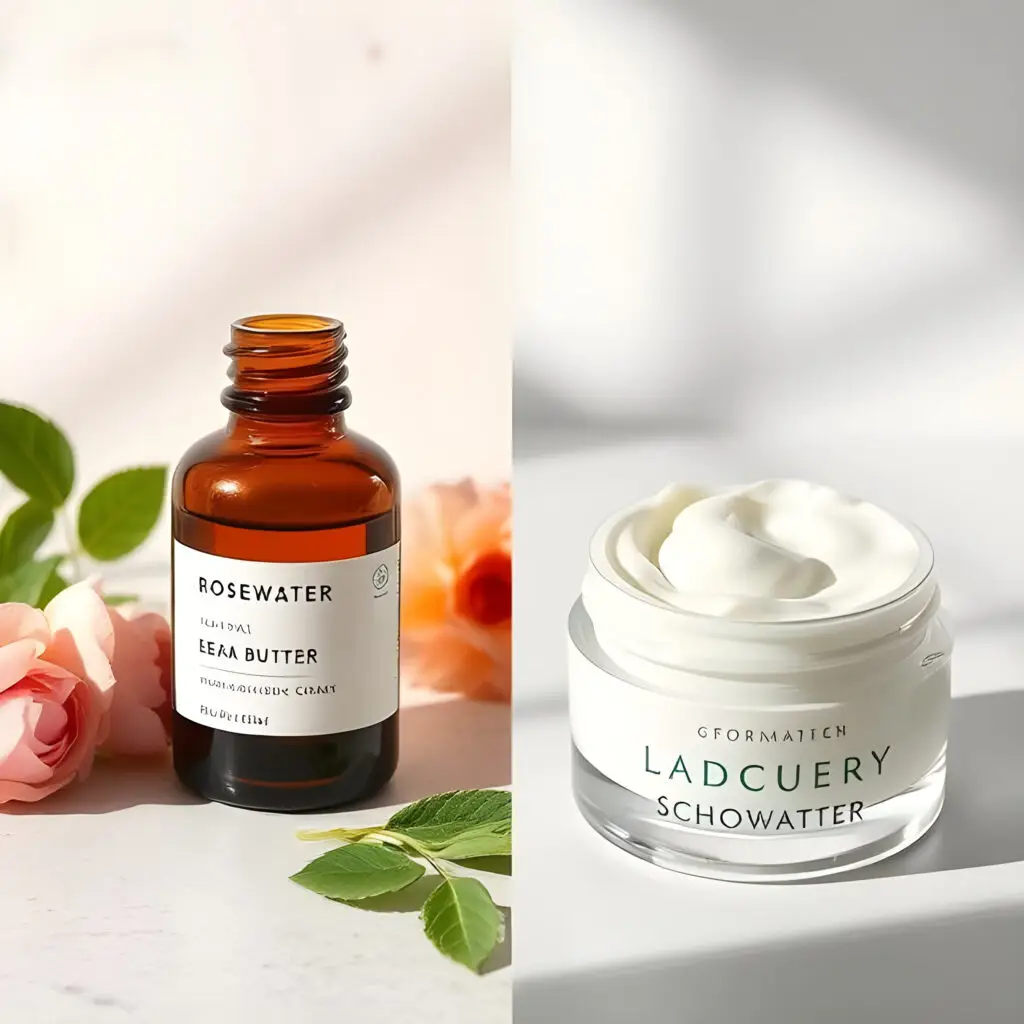
Side-by-Side Comparison: Natural vs. Chemical Skincare
| Category | Natural Skincare | Chemical Skincare |
|---|---|---|
| Main Appeal | Gentle, minimal, close to nature | Potent, quick-acting, lab-formulated |
| Safety | Lower risk of irritation if formulated properly | Can trigger allergies or reactions, especially with prolonged use |
| Sustainability | Often eco-friendly packaging and sourcing | Commonly packaged in plastic; may contain microplastics |
| Skin Health | Supports long-term barrier function | Some may damage microbiome or barrier over time |
| Transparency | Easier to identify ingredients | Involves complex, synthetic ingredients often hard to pronounce |
💡 In my own experience, chemical products gave fast but short-lived results, while natural skincare created long-term balance and glow.
Benefits of Using Natural Products for Skin (Explained Simply)
Let’s pause and appreciate the everyday, no-fluff perks of switching to a natural routine.
- ✅ Less Overload on Skin: No unpronounceable additives, no colorants, no BS.
- ✅ Gentle Yet Effective: Think of it like yoga for your skin—not harsh, but deep-acting.
- ✅ Works With Your Skin, Not Against It: Natural oils and botanicals sync with your skin’s natural barrier.
- ✅ Multi-tasking Goodness: One product often handles hydration, repair, and glow.
- ✅ Cultural Wisdom Backed by Time: Ayurveda and indigenous skincare rituals have stood the test of centuries.
Natural Skincare Homemade Recipes (Tried & Tested)
Yes, you can make skincare at home—and it doesn’t need to be Pinterest-perfect.
Easy DIY Face Mask (My Go-To for a Glow)
Ingredients:
- 1 tsp turmeric
- 1 tbsp gram flour (besan)
- 2 tbsp curd or rosewater
- A few drops of honey
Mix. Apply. Leave on for 15 minutes. Wash off for glowy, even skin. Perfect before a big day.
Top 5 Organic Skincare Brands on Amazon
I’ve personally tested a bunch of them—here are the ones worth your wallet:
| Brand | Best Product | Why I Love It |
|---|---|---|
| Juicy Chemistry | Aloe Vera & Lemon Water Toner | 100% certified organic, great for oily skin |
| Earth Rhythm | Phyto-Repair Serum | Gentle, effective, and eco-packaged |
| Soultree | Ayurvedic Nutgrass Face Wash | Made with bhasma, feels very natural |
| Kama Ayurveda | Kumkumadi Oil | Pricey, but it’s literal gold for glowing skin |
| Khadi Natural | Rose & Honey Cleanser | Budget-friendly and smells amazing |
FAQ: People Also Ask…
Q: Why do people prefer natural skincare?
A: It’s perceived as safer, more sustainable, and aligned with holistic health principles.
Q: What are the benefits of natural skin care?
A: Fewer irritants, nutrient-rich ingredients, and long-term skin health.
Q: Which is better, natural or chemical skincare?
A: Depends on your skin goals—but natural skincare is often gentler and more sustainable.
Q: Is natural skincare better than synthetic?
A: For sensitive, reactive, or long-term use—yes. Especially if you’re after wellness and glow.
Helpful Reads
- Scientific article on the benefits of plant-based skincare
- How to get clear skin with Ayurveda beauty routine
- Ayurvedic Skin Care Routine: A Holistic Path to Radiant Skin
Natural Skincare Myths You Need to Ditch (Right Now)
Let’s bust some myths. I’ve fallen for a few of these myself before digging deeper.
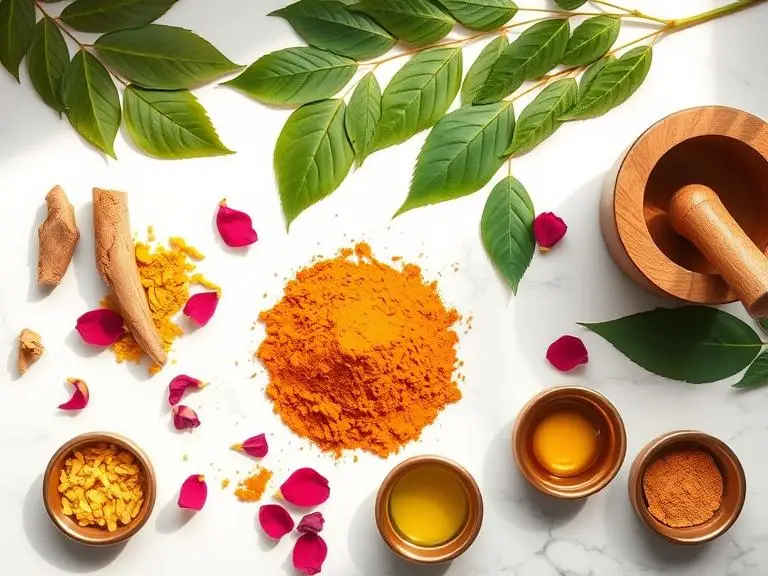
Myth 1: “If it’s natural, it won’t cause irritation.”
Nope. Poison ivy is natural too, right? Always patch-test—even nature can surprise you.
Myth 2: “Natural skincare works instantly.”
Wrong again. While chemical-based products might show quick results, natural skincare takes time—but the results are deeper and longer-lasting.
Myth 3: “You don’t need sunscreen if you use natural products.”
Big no. Whether you use rosehip oil or vitamin C serum from a plant, SPF is non-negotiable.
Myth 4: “Homemade is always better.”
Not always. Some DIY recipes can mess with your pH or clog pores. Stick to tried-and-tested Ayurvedic formulations or simple combos.
How to Choose the Right Natural Skincare Products
Here’s what I do before buying a new natural skincare product—and you should too.
My Simple Checklist:
- Check the label: Look for short, plant-based ingredient lists.
- Avoid greenwashing: “Natural” doesn’t mean anything unless it’s backed by certifications (like USDA Organic, Ecocert).
- Look for cold-pressed oils: They retain nutrients better than heat-processed ones.
- Read real reviews: Especially those with before/after photos or user experience stories.
- Understand your skin type: Dry? Oily? Combo? Tailor your natural products accordingly.
Pro Tip: Ayurveda classifies skin types as per doshas—Vata (dry, thin), Pitta (sensitive, acne-prone), and Kapha (oily, thick). Use this lens when picking products!
Ayurvedic Insight: Why Natural Skincare Aligns with Holistic Wellness

In Ayurveda, your skin isn’t just something to treat—it’s something to nourish from within.
- Rasa Dhatu (plasma) is the foundation of healthy skin.
- Dinacharya (daily rituals) like oil massage (Abhyanga) with kumkumadi tailam or neem oil restore balance.
- Tikta and Kashaya rasa (bitter and astringent tastes) are emphasized for internal cleansing—think turmeric, neem, manjistha.
So, natural skincare isn’t just topical—it’s an inside-out philosophy rooted in centuries of tradition.
Final Thoughts: Why Is Natural Skincare Better?
After years of experimenting and learning (read: lots of mistakes and flaky skin), here’s what I truly believe:
Natural skincare isn’t a fad. It’s a return to how our skin wants to be treated—gently, wisely, and consistently.
It’s better because:
- It respects your body’s rhythm.
- It offers real nourishment, not quick fixes.
- It connects you to nature (and even to your grandma’s kitchen remedies).
- And most importantly—it works, if you’re patient.
Key Takeaways (Recap Time!)
- Natural skincare is better for long-term skin health, especially when combined with Ayurvedic principles.
- Synthetic and chemical-based products may give quick results but often compromise your skin barrier.
- Ingredients like neem, turmeric, sandalwood, aloe vera, and rosehip are safe, effective, and versatile.
- Always read labels, avoid greenwashing, and patch-test everything.
- Treat your skin like you’d treat a garden—not with force, but with gentle daily care.
Summary: Why Choosing Natural Skincare Is a Wise Move
Choosing natural skincare is more than a beauty decision—it’s a lifestyle alignment.
You’re choosing:
- Fewer chemicals.
- Fewer irritants.
- More transparency.
- More results rooted in real, ancient wisdom.
Whether it’s through a bottle of cold-pressed almond oil, a homemade turmeric mask, or a certified organic moisturizer, natural skincare works because it nourishes, not disrupts.
It’s skin care, not skin correction.

